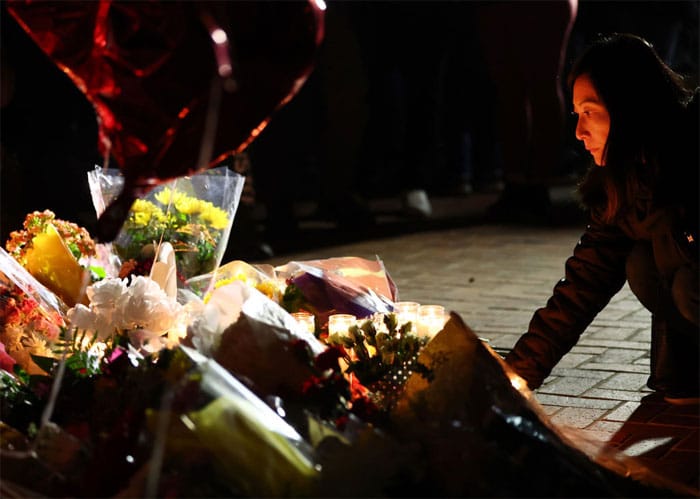 A person kneels at a candlelight vigil for victims of a deadly mass shooting at a ballroom dance studio on January 23, 2023 in Monterey Park, California. (Mario Tama / Staff / Getty Images)
A person kneels at a candlelight vigil for victims of a deadly mass shooting at a ballroom dance studio on January 23, 2023 in Monterey Park, California. (Mario Tama / Staff / Getty Images) When I heard about the tragic shootings in Monterey Park last weekend, I immediately thought of Poway. And Pittsburgh. And Charlottesville, and more and more in a steadily increasing and seemingly endless series of similar heartbreaking and senseless massacres. We know from sad experience that such horrors are not just terrible losses for those communities that are directly impacted by the deaths of their own sons and daughters, but for all the rest of us too. Which raises an obvious but uncomfortable question: why does the Jewish community not put more time and effort into forging these relationships at times other than these too-frequent catastrophes? Does it really take a shooting to encourage us to reach out?
This has not always been the case. As most of us know, American Jews have had a long and storied history of civil rights activism. In the early years of the 20th century, Jewish leaders were instrumental in founding the NAACP. In the 1960’s and 70’s, the Freedom Riders and other activists journeyed into southern states and helped form broad-based political coalitions in Los Angeles and many other large cities throughout the country.
But for the last several decades, these once-vital relationships have atrophied, and while there are still examples of individual synagogues and neighborhoods that continue to work to build ties with other under-represented communities, the types of collaborative efforts that flourished in the past are not nearly as visible or as consistent.
The lack of stronger ties between Jewish and Asian Pacific communities is especially noticeable, given the number of parallels that have emerged between the two groups.
The lack of stronger ties between Jewish and Asian Pacific communities is especially noticeable, given the number of parallels that have emerged between the two groups. For all of the cultural, academic and professional similarities that we share, the connections between American Jews and Asian Americans are unfortunately and indefensibly weak. There are exceptions: the Jewish Federation of Greater Los Angeles commendably supports a number of Asian Pacific groups through its civic engagement programs and the Anti-Defamation League does laudable work on any number of anti-hate fronts, including this one. But the wide-ranging cooperative efforts of previous decades no longer exist.
In the aftermath of the Monterey Park murders, Jewish organizations are issuing statements of support and Jewish individuals and synagogues will provide financial support for rebuilding efforts, just as Asian leaders did after Pittsburgh and Poway and Colleyville. These are commendable efforts and deserve immense praise.
But reaching out after a tragedy, while helpful, is the easiest and the most ephemeral form of outreach. The question is whether and how Jewish leaders here can build beyond this calamity to develop a more resilient and longer-lasting set of relationships. I am privileged to be involved in the Holocaust Museum LA’s Building Bridges project, in which the Center for Asians United for Self Empowerment (CAUSE) organization is a regular partner. In the first months of the coronavirus pandemic, we all talked about the vilification faced by many Asian Americans from ill-informed individuals who blamed them for the disease’s spread. It became a valuable opportunity to discuss the mutual challenges faced by our two communities. We all benefited greatly from these conversations and found many other common areas of interest and goals to which we could work together.
The opportunity that exists with the Asian American community is not unique. It’s equally critical for American Jews to renew our efforts to form stronger alliances with Black, Latino and other underrepresented minorities, and with other demographic groups with whom common purpose can be found – from the LGBTQ community on the left to evangelical Christians on the right. While none of these groups have sufficient numbers or clout to achieve all of their goals, each would benefit from a partner with the experience that the Jewish community can provide them.
In exchange, Jews would not only receive considerable political benefits, but even more importantly, could use these relationships to improve a cultural climate in this country that has become decidedly inhospitable to us. Given the ongoing series of unpleasant, objectionable and dangerous challenges that our community faces on a near-daily basis, making more and better friends would certainly be good for the Jews.
Dan Schnur is a Professor at the University of California – Berkeley, USC and Pepperdine. Join Dan for his weekly webinar “Politics in the Time of Coronavirus” (www.lawac.org) on Tuesdays at 5 PM.























 More news and opinions than at a Shabbat dinner, right in your inbox.
More news and opinions than at a Shabbat dinner, right in your inbox.